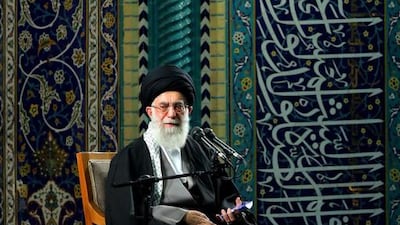GENEVA // Iran’s supreme leader voiced support for the negotiations over his country’s nuclear programme that resumed yesterday, but insisted there are limits to the concessions Iran will make in exchange for an easing of the sanctions choking its economy.
Ayatollah Ali Khamenei also derided Israel in strong language and accused it of being bent on besmirching Iran’s reputation.
Mr Khamenei, speaking before a paramilitary group in Tehran, aimed to placate hardliners and show his backing for the Iranian officials preparing to meet later in the day with international negotiators.
“I insist on not retreating one step from the rights of the Iranian nation,” Mr Khamenei, 74, told militiamen of the Basij force in a rare, live televised address.
The Iranian foreign minister Mohammad Javad Zarif and the European Union foreign policy chief Catherine Ashton met privately in Geneva ahead of an evening plenary session.
Mr Zarif told the Mehr news agency that his talks Wednesday afternoon with Ms Ashton, the chief negotiator of P5+1 powers, were “good”.
“We had good talks and discussed how to continue the process [of negotiations]. We have not yet entered discussing the draft,” he said.
The powers want the talks, the third since moderate Hassan Rouhani became president in August, to result in a “first phase” deal involving the freezing of certain of Iran’s nuclear activities.
This would give time to hammer out a longer-term accord that would reduce the programme to a size acceptable to the international community while removing sanctions placed on the Islamic republic.
Iran says its nuclear programme is peaceful but many in the international community suspect Tehran wants nuclear weapons. Any deal is likely to be a hard sell among hardliners in the US and Iran, as well as in Israel.
The Israeli prime minister Benjamin Netanyahu yesterday insisted on the need for a “real” solution to the Iranian nuclear crisis, after talks with the Russian president, Vladimir Putin, in Moscow.
“We would all like a diplomatic solution, but it needs to be a real solution,” said Mr Netanyahu, adding that this would involve Iran halting uranium enrichment and centrifuge work in the same way as Syria was allowing its chemical weapons arsenal to be destroyed.
Mr Putin for his part said he hoped that “in the nearest future a mutually acceptable solution is found” to end the crisis.
Iran has suggested it could curb its highest-known level of uranium enrichment – at 20 per cent – in a possible deal that could ease the US-led economic sanctions.
But Iranian leaders have made clear that their country will not consider giving up its ability to make nuclear fuel – the centrepiece of the talks since the same process used to make reactor stock can be used to make weapons-grade material.
Mr Khamenei said he would not “interfere in the details of the talks” – a clear nod of support for Mr Rouhani, which has opened historic exchanges with the US. However, Mr Khamenei also said the main goal of the talks is the “stabilisation of the rights of the Iranian nation, including nuclear rights.”
“There are red lines. There are limits. These limits must be observed,” the supreme leader told the Basij force, which is controlled by Iran’s powerful Revolutionary Guard. “We have told the authorities, and they are required to observe the limits and should not fear the blusters of the enemies and opponents.”
Mr Khamenei also blasted what he called the US government’s “warmongering” policies, including threats of military action, and he said sanctions cannot force unwanted concessions by Iran. At the same time, Mr Khamenei said his country has “no animosity”’ toward the American people and seeks “friendly” relations.
“Instead of using threats, go and repair your devastated economy so that your government is not shut down for 15 or 16 days,” he said, referring to the recent US government closure amid a congressional budget standoff. “Go and pay your debts.”
His complex message reflected Iran’s internal divisions over the nuclear talks and outreach to the US, which broke ties with Iran after hostage-takers stormed the US Embassy compound in Tehran in 1979 the wake of the Islamic Revolution.
President Barack Obamaand his national security team have US nd international opposition to a deal with Iran by saying the risk was worth taking because the alternative was a war no one wants.
* Associated Press with additional reporting from Reuters and Agence France-Presse

